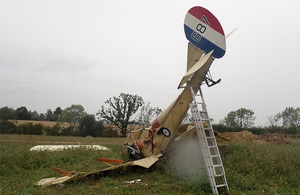Head of the OSCE Programme Office in Dushanbe: UK response
Ambassador Chiveri, thank you for your report and your presentation to the Permanent Council today. Please extend our thanks to your team for their work over the last year.
COVID-19 has presented operational challenges to us all and we appreciate the Programme Office’s effective response to this challenge and your delivery during this period, especially the continuing operations at the Border Management Staff College.
Tajikistan is an important partner to the UK and we will continue to support the country’s development through our own Central Asia programme, including on policy innovation, economic development and migrant reintegration. I was pleased to read the frequent references in your report to promoting gender equality and gender mainstreaming, including providing support to the sixteen Gender-Sensitive Police Units; combatting domestic violence through working with the fourteen Women’s Resource Centres; and furthering women’s participation by contributing to the draft law on gender quotas.
Peace, security and prosperity are all strengthened by drawing on the talents of all members of society, so it is vitally important that women are included in this effort. We particularly welcome the focus on gender in the work of the Border Management Staff College, who have continued to promote women within the traditionally male-dominated border management profession.
I would like to highlight three areas of work that I think deserve special attention.
First, the support your Programme Office provides to Tajik officials on border security via regional conferences and tactical training with officials from neighbouring countries. This is essential for increasing capacity and building trust and expertise in an area vitally important for Tajikistan and its partners.
Second, your work to promote socio-economic development, improving the investment climate, and support the development of small and medium-sized enterprises. As a country committed to free trade, we believe passionately in the power of enterprise to guarantee prosperity, safety and security. A more vibrant private sector also encourages Tajikistan’s brightest and best to explore opportunities at home and help contribute to their country’s future success.
We recognise how difficult this work has been during the pandemic, which is why the UK has reoriented our Enterprise and Innovation Programme to support start-ups and small businesses in Tajikistan to overcome the challenges of COVID-19 and protect existing jobs; whilst also delivering more of our support online. COVID-19 presents an opportunity to ‘build back better’, and so we welcome your Office’s support to the Tajik government on transitioning to a green economy. As COP President one of our main campaigns is to accelerate transitions in the global economy. We are asking all parties to show ambition when it comes to climate action and we encourage Tajikistan in its development of enhanced Nationally Determined Contributions and commitment to net zero by 2050.
Finally, on media freedom. We welcome the Office’s work on supporting the media regulatory body to improve professional journalistic standards in Tajikistan. A vibrant and skilled media is the essential ingredient for any healthy democracy. It empowers citizens by holding their government to account, and a transparent government builds trust amongst its people. We hope that the Government of Tajikistan will show further commitment to strengthening its democracy by engaging with ODIHR’s recent recommendations on enhancing the conduct of elections.
More generally, we appreciate the information your report provides on the outcomes achieved as a result of the Office’s activities, and we would welcome even greater focus on impact in your reporting. The OSCE’s field missions implement much good work, as evidenced today, and it is essential for the strength of the organisation that we can also clearly point to the real world impact that this work has. The UK – here in Vienna and through our Embassy in Dushanbe – extends its cooperation and support to the Office’s work.
Ambassador, thanks to you and your team for progressing the OSCE’s mandate in Tajikistan across all three dimensions of the OSCE.


